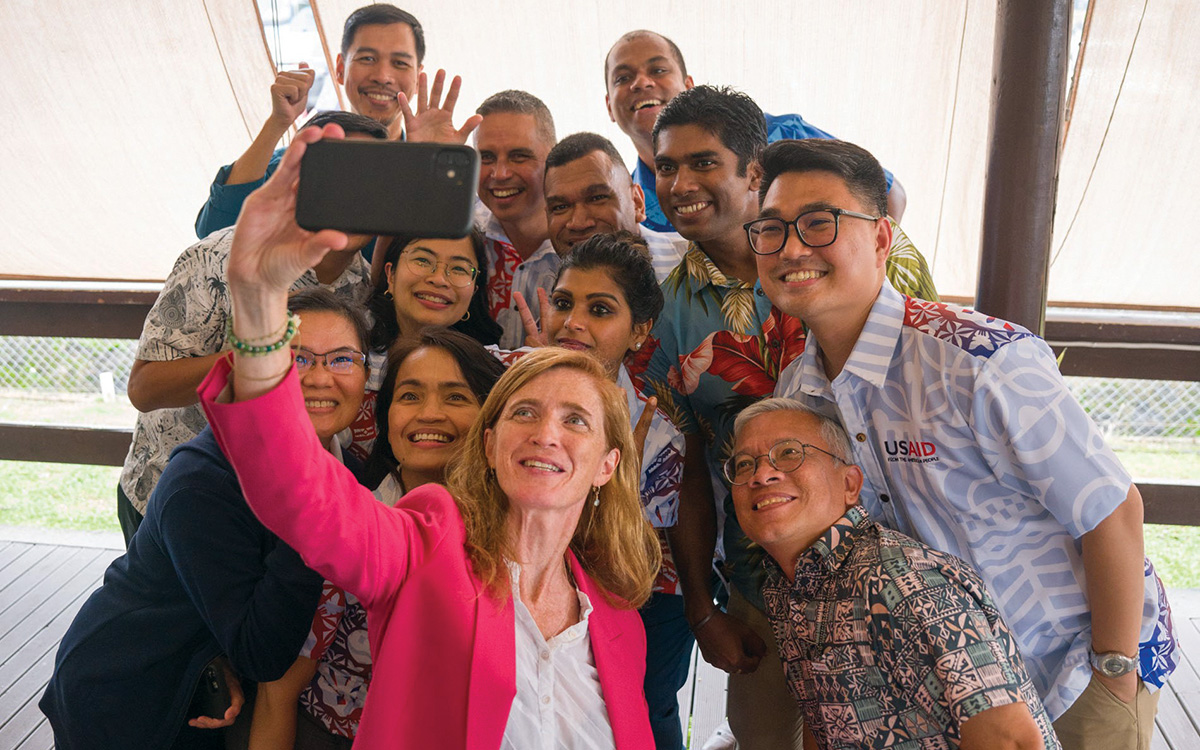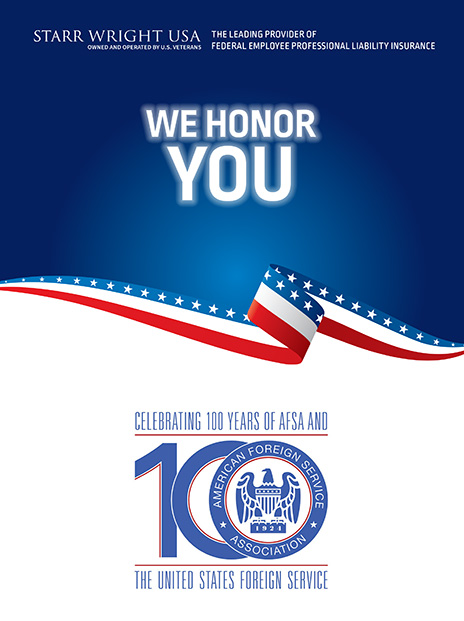Planting and Growing Seeds of Prosperity and Justice Worldwide
BY SAMANTHA POWER

Administrator Power takes a selfie with USAID’s local staff in Suva on Aug. 15, 2023. She met with local staff to understand their perspective on USAID’s priorities in the Pacific.
USAID / Boss Communication Agency

In 2022, while Foreign Service Officer (FSO) Scott Hocklander was serving his tour of duty as USAID Mission Director in Chisinau, Moldova, Russian President Vladimir Putin launched his full-scale invasion of Ukraine, beginning an open war on Moldova’s borders. Scott and his team sprang into action to support Moldova as it geared up to take in the highest number of refugees per capita in Europe, while also building the independence and resilience of its economy and energy infrastructure, which were deeply entwined with Russia’s.
In just a couple of years, Scott helped double the size of Moldova’s team—recruiting both more local staff and more FSOs eager to step up and support the Moldovan people as supply lines were cut due to the war. To overcome Moldova’s dependence on Russian gas, Scott and his team worked with the government to build a new Ministry of Energy from the ground up, while helping the country gain access to new sources of energy like the trans-Balkan pipeline.
And to diversify the economy, reduce its reliance on exports to Russia, and create jobs that would keep young Moldovans in Moldova, Scott and his team supported the country’s efforts to grow its IT industry. Scott, whose parents are both educators, even spearheaded a series of technology-focused courses like coding and cybersecurity at the local university. He made such an impression in Moldova that at his going-away party, everyone from local farmers to former Prime Minister Natalia Gavrilita came to say goodbye.
As USAID Administrator, I have had the pleasure of getting to meet USAID’s FSOs serving around the world—extraordinary individuals who leave the comfort of their homes to help take on some of the world’s toughest challenges, from authoritarianism to disease to extreme poverty—often putting themselves in volatile or dangerous places to do so. They form close connections with communities, supporting their efforts to identify and dismantle the barriers standing in the way of progress.
The true impact USAID FSOs have had across decades of service is impossible to quantify. But their stories give us a sense of the mark they’ve left around the world.

Administrator Power (speaking) holds a working meeting with local staff from Papua New Guinea and the Philippines on Aug. 14, 2023.
USAID / O2 Visuals Png
For instance, back in the 1970s, FSO Julius Coles worked with his team to promote economic growth and bolster the health care sector in Liberia, a country that at the time had only 50 miles of paved roads. With many farmers struggling to get through dense forests to sell their produce at markets, the USAID Mission worked with local communities to identify the places where easier transport would have the biggest impact and to build “farm-to-market” roads, connecting these rural farmers with towns and opening up new opportunities for agricultural commerce.

U.S. Ambassador to Ukraine Bridget Brink (at left) and USAID / Ukraine Mission Director James Hope welcome Administrator Power as she arrives in Kyiv by train on July 17, 2023.
USAID / U.S. Embassy Kyiv
And when Julius and his team ran into challenges working in very different environments than they’d always known, they built global coalitions and drew on the expertise of those with firsthand experience to find solutions. For instance, when Julius arrived in Liberia, the John F. Kennedy Medical Center—a 500-bed seaside hospital that had just been constructed by USAID—was already falling into disrepair, as the tropical salt air corroded the tools and medical equipment and even the windows. So Julius and his team enlisted the Indian Health Service, which had deep experience operating health facilities in tough tropical environments.
Together, the Indian Health Service and USAID worked to help fix and manage the hospital. Today, the Kennedy Medical Center is the largest referral hospital in Liberia. And after Julius’s 28-year career at USAID, he would become the director of Morehouse College’s Andrew Young Center for International Affairs, where he would spend years imparting the skills he learned during his service to succeeding generations.
Another FSO, Anne Arnes, worked in Pakistan in 2008 while the country was holding important parliamentary elections. After leading candidate Benazir Bhutto was assassinated, an already-tense security situation threatened to turn into an explosion of grief and rage, casting into doubt whether the elections could go forward. Indeed, the partner in charge of overseeing election observation pulled out just two weeks before the election due to security concerns.
Anne and her colleagues worked day and night, leveraging every relationship they’d built in Pakistan and back in Washington to find an alternative, ultimately setting up a replacement national election observation program in less than two weeks. With observers in place across the country, the elections proceeded without incident. As Anne put it: “That kind of ability, to work as a team and put exceedingly complex things together in a crisis and then carry through to completion—that’s AID at its best.”
The dedication and hustle of people like Scott, Julius, and Anne have helped plant—and grow—seeds of prosperity, health, stability, and justice in the farthest reaches of our planet. I want to thank every one of our Foreign Service officers and all those who give so much to make your contributions possible: your partners, your parents, your children, and, in many cases, even your pets! You all represent the best of America around the world: compassion, creativity, an understanding of how interconnected we are—and an unmatched ability to deliver results.
Here’s to the next 100 years of service.
When sharing or linking to FSJ articles online, which we welcome and encourage, please be sure to cite the magazine (The Foreign Service Journal) and the month and year of publication. Please check the permissions page for further details.
Read More...
- “Supporting Civil Society in the Face of Closing Space” by Mariam Afrasiabi and Mardy Shualy, The Foreign Service Journal, May 2018
- “Q&A with USAID Administrator Samantha Power,” The Foreign Service Journal, November 2021




